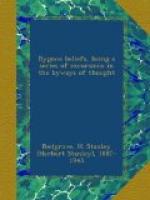he had not proceeded to the work because he had failed
to meet with an elect woman who was necessary thereto”;
and proceeds to say: “I suppose that the
statement will awaken in most minds only a vague sense
of wonder, and I can merely indicate in a few general
words that which I see behind it. Those Hermetic
texts which bear a spiritual interpretation and are
as if a record of spiritual experience present, like
the literature of physical alchemy, the following aspects
of symbolism: (
a) the marriage of sun
and moon; (
b) of a mystical king and queen;
(
c) an union between natures which are one at
the root but diverse in manifestation; (
d)
a transmutation which follows this union and an abiding
glory therein. It is ever a conjunction between
male and female in a mystical sense; it is ever the
bringing together by art of things separated by an
imperfect order of things; it is ever the perfection
of natures by means of this conjunction. But
if the mystical work of alchemy is an inward work
in consciousness, then the union between male and
female is an union in consciousness; and if we remember
the traditions of a state when male and female had
not as yet been divided, it may dawn upon us that
the higher alchemy was a practice for the return into
this ineffable mode of being. The traditional
doctrine is set forth in the
Zohar and it is
found in writers like Jacob Boehme; it is intimated
in the early chapters of Genesis and, according to
an apocryphal saying of Christ, the kingdom of heaven
will be manifested when two shall be as one, or when
that state has been once again attained. In the
light of this construction we can understand why the
mystical adept went in search of a wise woman with
whom the work could be performed; but few there be
that find her, and he confessed to his own failure.
The part of woman in the physical practice of alchemy
is like a reflection at a distance of this more exalted
process, and there is evidence that those who worked
in metals and sought for a material elixir knew that
there were other and greater aspects of the Hermetic
mystery."[1b]
[1a] MICHAEL MATER: Atalanta Fugiens
(1617), p. 97.
[1b] A E. WAITE: “Woman and the Hermetic
Mystery,” The Occult Review (June 1912),
vol. xv. pp. 325 and 326.
So far Mr WAITE, whose impressive words I have quoted
at some length; and he has given us a fuller account
of the theory as found in the Zohar in his
valuable work on The Secret Doctrine in Israel
(1913). The Zohar regards marriage and
the performance of the sexual function in marriage
as of supreme importance, and this not merely because
marriage symbolises a divine union, unless that expression
is held to include all that logically follows from
the fact, but because, as it seems, the sexual act
in marriage may, in fact, become a ritual of transcendental
magic.




